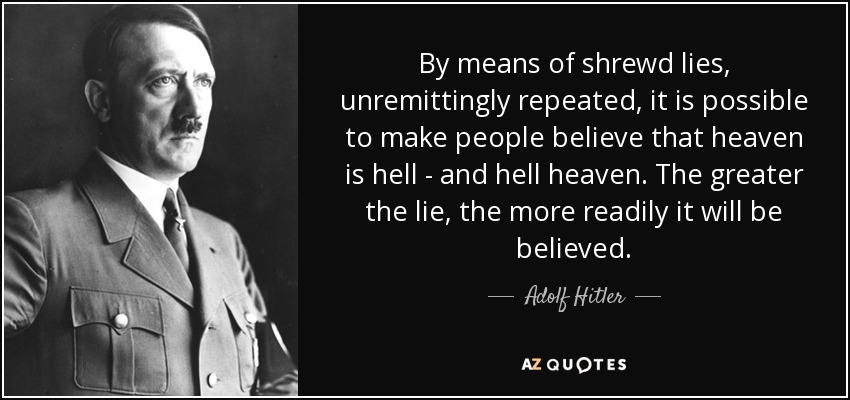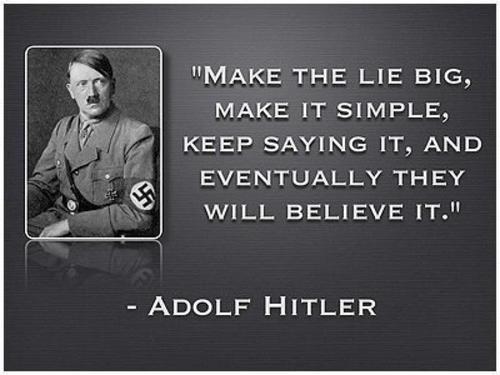Alan: As a child in the 1950s, the Mercy Sisters at St. Thomas the Apostle grammar school in Irondequoit, New York were clear: "The church does not teach that any human soul resides in Hell. In fact, we must pray for the salvation of everyone, even Hitler."
Universal Resurrection
Monday, December 18, 2017
For Christians, Jesus Christ is the ultimate symbol of the universal pattern of union with the divine: “When Christ is revealed, and he is your life, you will be revealed in all your glory with him” (Colossians 3:4). God’s clear goal and direction for humanity is mutual indwelling, where “the mystery is Christ within you, your hope of glory” (Colossians 1:27). Henceforth we know our true and lasting life in the new “force field” that Paul calls the Body of Christ, not in any individual or private perfection. If it is private, then it is not perfection. We live no longer, but Christ lives in us (Galatians 2:20). This is a knowing so grand that only the Whole Body can fully experience it. We simply participate.
After his resurrection, Jesus tells the disciples, “I am not a ghost! I have flesh and bones, as you can see” (Luke 24:39). To Thomas, Jesus says, “Put your finger in my wounds!” (John 20:27). In other words, “I am human!”—which means to be wounded and yet resurrected at the same time. Jesus returns to his physical body unlimited by space or time, without any regret or recrimination. This is the utterly counterintuitive message of the Risen Jesus.
Jesus reveals the purpose and fullness of humanity, which is “that we are able to share in the divine nature” (2 Peter 1:4), even in this wounded and wounding world. Through our “divine adoption,” we share in Jesus’ inheritance as “heirs of the same promise” (Galatians 3:29). Our code word for that is heaven. As Jesus said, “In my Father’s house there are many mansions, and I have gone ahead to prepare a place for you. . . . I shall return to take you with me so that you may be where I am” (John 14:2-3).
I do believe in the “bodily” resurrection of Jesus or my basic premise of body and spirit being one (incarnation) does not stand! I am quite traditional and orthodox here. Resurrection does not only mean an eternal reward in the future. “As now, so later!” Resurrection is the Incarnation taken to its full and logical conclusion. What we choose now, we will indeed be. It is our own decision (which is why almost all the world religions posit some idea called “hell”). We must protect the idea of human freedom, because love can only exist in the realm of freedom. God wants love partners, not robots or clients.
Alan: Human freedom is a useful (and perhaps "necessary") fiction.
But it is also a "conditioned reality."
But it is also a "conditioned reality."
Perhaps the most surprising outcome of Trump's election is proof that people -- particularly "good Christians" -- can be conditioned to believe anything, and with each step deeper into perdition these "good people" are not motivated by a conscious choice to embrace evil but a conviction -- often a conviction arising from their fundamental religious beliefs -- that Trump is, in fact, their personal savior and the savior of the nation.
We are all stuck where we are stuck.
And "coming unstuck" is a slow, tedious, painful process.
We are all stuck where we are stuck.
And "coming unstuck" is a slow, tedious, painful process.
"Free Will" is nowhere near as free as orthodox Christian theology holds.
The nearly universal obsessions-and-compulsions that compromise "Free Will" are real and they afflict us all.
They even afflict -- I will say "particularly afflict" -- "the most orthodox," people who are obsessively compelled to defend "Free Will" and other canonized orthodoxies that do not "hold up" without psycho-spiritual contortionism and intellectual arabesques that put Harrison Bergeron to shame. https://paxonbothhouses.blogspot.com/2017/09/harrison-bergeron-and-other-self.html
I encourage you to observe the following set of mental calesthenics required by Pope Innocent III's conciliar pronouncement anathematizing the use of bows and arrows. https://forums.catholic.com/t/pope-innocent-iii-and-crossbows/318167
More fundamentally, if "good Christians" can rationalize the election of Donald Trump, they (we?) can rationalize any god-damned thing.
For brevity's sake, I will not probe individual human beings' "genetic pre-predisposition to evil" as manifest in psychopaths time-out-of-mind, a fact that is coming-to-light only now as a result of modern psychological research which is one reason why many "orthodox" Christians spurn science.
The strange case of Phineas Gage is also telling.

The "absolutism" of "the orthodox" cannot admit the contradiction of traditional beliefs. For if they did, their "existential crisis" as "true believers" would not only require surrender of literal/absulutist "truth" but would eliminate the comfort absolutism affords.
Here is the bargain Christian traditionalists make: "If I play by the rules, if I sign off on the WHOLE dogmatic package, my "personal salvation" is assured.
For most people -- particularly those who believe that eternal torment is a real possibiity -- self-interested "salvation assurance" is Life's prime directive. It is not love. Not service. Not mercy, compassion or forgiveness. Not even the words Jesus speaks in the four canonical gospels.
What matters most is that "I" can rest assured that I've been spared "The Lake of Unquenchable Fire.
This central fixation on one's own salvation is an extremely subtle form of egotism. Such ferocious self-interest trumps Truth by clinging to tradition, not only for tradition's sake but because tradition provides the continuity-of-teaching that "proves them right" and thus insures their personal salvation.
They even afflict -- I will say "particularly afflict" -- "the most orthodox," people who are obsessively compelled to defend "Free Will" and other canonized orthodoxies that do not "hold up" without psycho-spiritual contortionism and intellectual arabesques that put Harrison Bergeron to shame. https://paxonbothhouses.blogspot.com/2017/09/harrison-bergeron-and-other-self.html
I encourage you to observe the following set of mental calesthenics required by Pope Innocent III's conciliar pronouncement anathematizing the use of bows and arrows. https://forums.catholic.com/t/pope-innocent-iii-and-crossbows/318167
More fundamentally, if "good Christians" can rationalize the election of Donald Trump, they (we?) can rationalize any god-damned thing.
For brevity's sake, I will not probe individual human beings' "genetic pre-predisposition to evil" as manifest in psychopaths time-out-of-mind, a fact that is coming-to-light only now as a result of modern psychological research which is one reason why many "orthodox" Christians spurn science.
The strange case of Phineas Gage is also telling.

Shades Of Phineas Gage: Brazilian Worker Survives Iron Bar Piercing Skull
The "absolutism" of "the orthodox" cannot admit the contradiction of traditional beliefs. For if they did, their "existential crisis" as "true believers" would not only require surrender of literal/absulutist "truth" but would eliminate the comfort absolutism affords.
Here is the bargain Christian traditionalists make: "If I play by the rules, if I sign off on the WHOLE dogmatic package, my "personal salvation" is assured.
For most people -- particularly those who believe that eternal torment is a real possibiity -- self-interested "salvation assurance" is Life's prime directive. It is not love. Not service. Not mercy, compassion or forgiveness. Not even the words Jesus speaks in the four canonical gospels.
What matters most is that "I" can rest assured that I've been spared "The Lake of Unquenchable Fire.
This central fixation on one's own salvation is an extremely subtle form of egotism. Such ferocious self-interest trumps Truth by clinging to tradition, not only for tradition's sake but because tradition provides the continuity-of-teaching that "proves them right" and thus insures their personal salvation.
Jesus Rails Against Human Traditions Of "Our Great Leaders Who Lived Long Ago"
Pope Francis: There Are Two Ways Of Having Faith: We Can Fear To Lose The Saved," Or...
In defense of Free Will -- conditioned as it is -- recall Robert Browning's act of faith in core fiction: "A man's reach should exceed his grasp or what's a heaven for?"
Faith is essential to human wellbeing, even when it requires belief in falsehood.
Faith is essential to human wellbeing, even when it requires belief in falsehood.
I hasten to add that if "essential falsehood" does not work toward "universal salvation," the result of radically self-interested fiction tends toward cruelty-in-individuals and submission-to-autocrats in The Body Politic.
"The Hard, Central Truth Of Contemporary Conservatism"
Often, Stinginess And Cruelty Are Christianity's Paradoxical Effects
http://paxonbothhouses.blogspot.com/2016/02/often-christianitys-paradoxical-effects.html
G.K. Chesterton On Charity, Hope And Universal Salvation
Finally, it is crucial to be conscious of our necessary fictions while embracing them as mythic means to real ends.

Heaven is first of all now and therefore surely later. If God loves and accepts us now in our broken state, why would the divine policy change after our death? It is the same God and we are the same humans. For many of the early Eastern Fathers of the Church and for the mystics, salvation was not a question of if but when. How soon are you ready to allow God to show infinite love to you? Many do seem to wait until the very end. Some of the Church Fathers said that once we see the Infinite Mercy, we wouldn’t be able to resist it. (That is what Catholics actually meant by our strangely formulated belief in purgatory.)
Universal restoration or apokatastasis (see Acts 3:21) was recognized by many in the Eastern Church, but Western Christianity, both Roman and Protestant, paid little attention. We interpreted the New Testament largely in terms of individual and private salvation, which is hardly salvation. Only a very, very few win by our stingy criteria. We still wait for “the new heaven and the new earth” promised by Isaiah (65:17) and again at the very end of the Bible (Revelation 21:1).
"Christian Conservatism: "The Saved," "The Damned," "The Rich," "The Poor"
Apocatastasis
Wikipedia
Gateway to Silence:
Going home to Love
References:
Adapted from Richard Rohr, Immortal Diamond: The Search for Our True Self (Jossey-Bass: 2013), 85-86; and
Things Hidden: Scripture as Spirituality (Franciscan Media: 2007), 212.
Things Hidden: Scripture as Spirituality (Franciscan Media: 2007), 212.

No comments:
Post a Comment